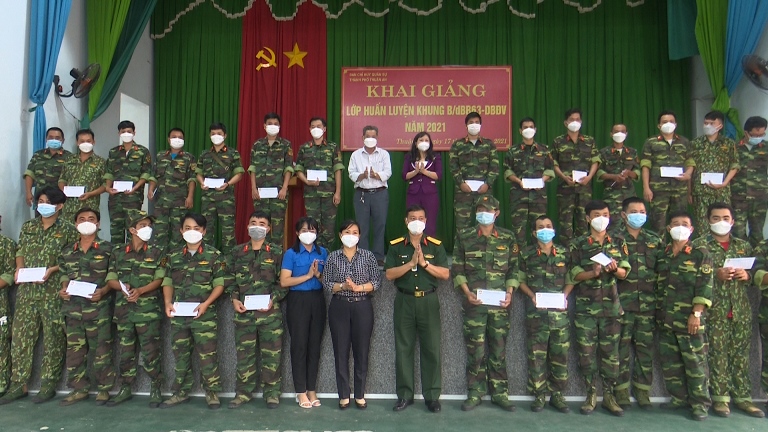Regimes and policies for reserve officer training trainees in Vietnam
What are the regimes and policies for reserve officer training trainees in Vietnam? - Hoai An (Dong Nai)

Regimes and policies for reserve officer training trainees in Vietnam (Internet image)
Regarding this issue, LawNet would like to answer as follows:
1. Regimes and policies for reserve officer training trainees
Regimes and policies for reserve officer training trainees; the regime for visiting retired reserve officers according to Article 7 of Decree 79/2020/ND-CP is as follows:
* Salary, allowances, and benefits:
- Cadres, civil servants, public employees, and reserve non-commissioned officers who are working, studying, and working in agencies and organizations and receiving salaries from the state budget, during the training period for reserve officers, the agency or organization where they are working, studying, and working shall be paid full salary and allowances, allowances, travel allowances, and transportation allowances according to current regulations.
- Professional soldiers who leave active service will be sent to train reserve officers; during the training period, they are entitled to full salary and allowances, including transportation allowances and travel allowances, as are active-duty professional soldiers.
- Non-commissioned officers who are about to be demobilized are sent to train reserve officers. During the training period, they are entitled to allowances and the same regimes and policies as non-commissioned officers, soldiers serving in the army, and those discharged from the army; At the end of the training period, reserve officers will be discharged from the army.
- Reserve non-commissioned officers do not receive salaries from the state budget. During the training period of reserve officers, they are entitled to monthly allowances according to military rank in the first 2 years of active duty as non-commissioned officers with the same military rank.
- Those who graduated from university or higher do not receive salary from the state budget; When graduating from university, during the reserve officer training period, the monthly allowance is equal to the military rank allowance of the sergeant major level.
- The subjects specified at Points d and dd of Clause 1 Article 7 of Decree 79/2020/ND-CP are entitled to payment of transportation fees and travel allowances similar to those of active-duty military personnel; The time for receiving allowances according to military rank is the training time of each subject.
- Students who graduate from reserve officer training, in addition to their current salary and allowance, are entitled to an additional month's salary according to the rank of reserve officer conferred (not including meals, military rank allowance, social insurance, or health insurance that month).
* Meal regime:
Subjects who are sent to train reserve officers, during the training period, are guaranteed food by the training facility, just as trainees who train squad officers are.
In case of a sick stay in the hospital for inpatient treatment, they are entitled to medical meals, but after the training period has not yet recovered, they will be paid for medical meals for a maximum of 15 days.
* Regime of military equipment, living supplies:
- First-class reserve non-commissioned officers; cadres, civil servants, and public employees outside the Army who receive salaries from the state budget; those graduating from university or higher who do not receive salaries from the state budget, students upon graduating from university, during their reserve officer training period, are granted or borrowed military equipment and living supplies.
- Professional soldiers who are demobilized and non-commissioned officers about to be demobilized, during the training period of reserve officers, are entitled to the same regime of military equipment and daily-life supplies as professional soldiers and active non-commissioned officers.
* Regulations on leave, postponement of training reserve officers for cadres and civil servants working in agencies and units outside the Army:
- If they are on annual leave and are called to train reserve officers, the remaining days of leave will be continued after graduating from reserve officer training or taking leave at an appropriate time.
- If the time to focus on training reserve officers coincides with the time of the promotion exam, which will be at the end of the in-service professional course (certified by the agency or unit where the workplace is located), they are allowed to postpone the call to train reserve officers for that batch.
* Social insurance, health insurance:
Trainees who have been training reserve officers for 3 months or more and have not yet participated in social insurance or health insurance, and during the training period, they will have to pay health insurance premiums by the training institution; the level of payment and enjoyment of health insurance is the same as for active-duty non-commissioned officers.
* Regime for sickness, accident, or death:
Subjects specified in Clause 5, Article 7 of Decree 79/2020/ND-CP, if they have an accident, die due to an accident, or die due to illness or a dangerous accident, according to the provisions of Clauses 2, 3, and 5, Article 6 of Decree 79/2020/ND-CP.
* Regarding participating in the recruitment exam for cadres, civil servants, and public employees:
Subjects selected during the reserve officer training period shall have a notice of examination for recruitment of civil servants or public employees or the examination for promotion to civil servant rank or promotion to public employee professional titles decided by competent authorities. They are allowed to be absent from school to participate in the exam; the time off does not exceed 07 days in the course. The results of the entrance exam are reserved until the completion of the reserve officer training course.
* The regime of visiting the deceased reserve officer:
The officer who was serving in the local reserve rank died; the district-level military command board and the commune-level military command board organized a visit at a rate of VND 1,600,000/case.
2. Who are the subjects of reserve officers registration in Vietnam?
According to Article 39 of the Law on Vietnam People’s Army Officers 1999, the following persons shall be subject to reserve officers registration:
- Officers, cadres being professional military personnel, who, when discharged from the active service in the army, still meet the criteria and conditions prescribed for reserve officers;
- Professional military personnel and non-commissioned officers, who have been discharged from active service in the army, and reserve non-commissioned officers who have been under the officers’ training;
- State officials and employees outside the army and persons with university or higher degrees and with profession suited to the requirements of the army, who have been trained as reserve officers.
- Key word:
- reserve officers
- in Vietnam
- Cases of land rent exemption and reduction under the latest regulations in Vietnam
- Economic infrastructure and social infrastructure system in Thu Duc City, Ho Chi Minh City
- Regulations on ordination with foreign elements in religious organizations in Vietnam
- Increase land compensation prices in Vietnam from January 1, 2026
- Determination of land compensation levels for damage during land requisition process in Vietnam
- Who is permitted to purchase social housing according to latest regulations in Vietnam?
-

- Emergency response and search and rescue organizations ...
- 10:29, 11/09/2024
-

- Handling of the acceptance results of ministerial ...
- 09:30, 11/09/2024
-

- Guidance on unexploded ordnance investigation ...
- 18:30, 09/09/2024
-

- Sources of the National database on construction ...
- 16:37, 09/09/2024
-

- General regulations on the implementation of administrative ...
- 11:30, 09/09/2024
-

- Notable new policies of Vietnam effective as of ...
- 16:26, 11/04/2025
-
.Medium.png)
- Notable documents of Vietnam in the previous week ...
- 16:21, 11/04/2025
-
.Medium.png)
- Notable documents of Vietnam in the previous week ...
- 16:11, 02/04/2025
-
.Medium.png)
- Notable new policies of Vietnam to be effective ...
- 16:04, 02/04/2025
-
.Medium.png)
- Notable new policies of Vietnam effective from ...
- 14:51, 21/03/2025

 Article table of contents
Article table of contents
